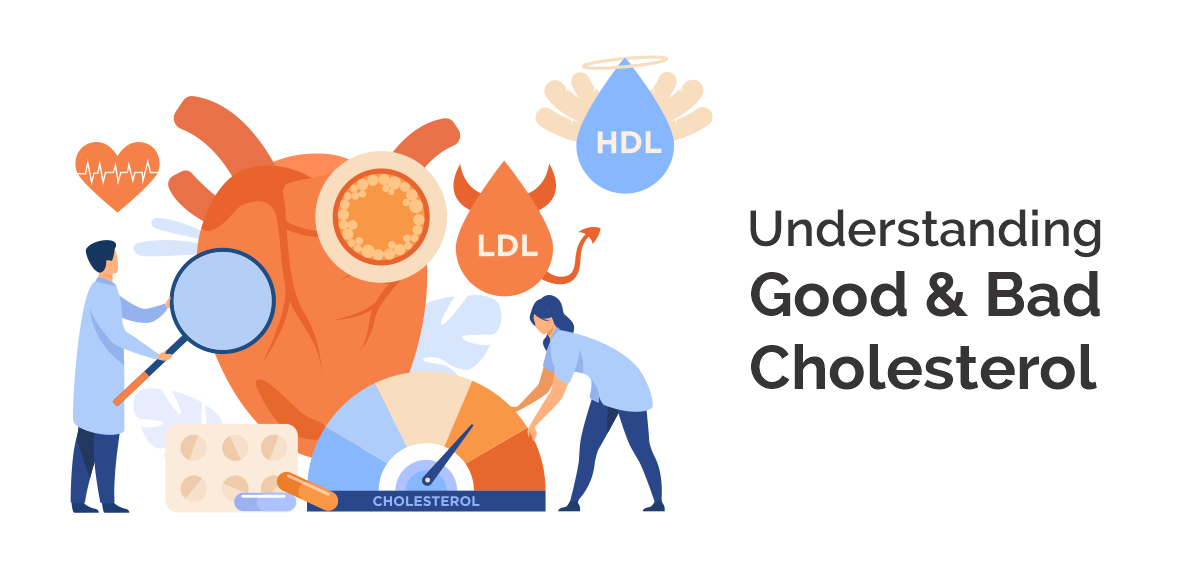

One of the most common health issues in India has always been high cholesterol. The Indian diet isn't exceptionally high in harmful fats, but fast food has impacted our genetics.
Fact: Cholesterol can be found in a wide variety of foods, including part of a well-balanced diet.
Read on to know more about Good and Bad Cholesterol!
Understanding the different forms of cholesterol is crucial.
Yes, good cholesterol does exist. We need some amount of healthy fats as well.
Here you go - Good and Bad Cholesterol are:-
The distinction between "good" and "bad" cholesterol may not be evident. To better comprehend your following lipid panel results, it is essential to know the difference.
Ex: Avocado oil is good
Margarine/Mayonaise is bad
Wish crucial differences between Good and Bad Cholesterol could be as simple as that?
Doctors with Assurance can assist you in managing your cholesterol levels and assess the possible health effects of your condition. Consult an emergency medicine specialist with Us and rest assured, you are in safe hands.
Assurance has a dedicated cholesterol disease management program so that people like you who are facing difficulties in managing cholesterol and get a shot at a good & healthy life.
Definition of "healthy cholesterol."
Lipoproteins are proteins that transport cholesterol through the blood. HDL, or high-density lipoprotein, is one of those forms of lipoproteins. HDL carries cholesterol from the intestines to the liver, where it is excreted.
HDL is a critical player in the fight against heart disease and stroke by helping to lower levels of "bad" cholesterol in the bloodstream. Having too little HDL cholesterol is just as bad for your health as having too much, and a healthy level of cholesterol in the bloodstream requires HDL.
What is considered as bad cholesterol?
If you've ever heard of "bad" cholesterol, you've probably heard of low-density lipoproteins (LDL). The majority of your cholesterol is LDL.
Plaque can build up in your blood vessels if you have a high level of LDL cholesterol. Eventually, your arteries get clogged and hardened, preventing blood from reaching your heart and other vital organs. Stroke and heart disease are among the long-term risks of high LDL cholesterol.
HDL delivers cholesterol to the liver, which can be eliminated from the bloodstream before it accumulates in your arteries. Atherosclerosis, a build-up of plaque in the arteries that can lead to heart attack and stroke, is one possible outcome.
Hope you got some clarity on Good and Bad Cholesterol.
Know your numbers
The desired values in most healthy adults without risk factors for heart disease are:
- LDL cholesterol: lower than 130 mg/dL
- HDL cholesterol: greater than 40 to 60 mg/dL (higher numbers are desired)
- Total cholesterol: less than 200 mg/dL
- Triglycerides: 10 to 150 mg/dL
- VLDL: 2 to 30 mg/dL
Cholesterol levels alone are not sufficient for predicting the likelihood that you may develop coronary artery disease. They're simply one of a number of risk variables that must be taken into account when assessing a person's overall health. The combination of these factors will assist your doctor in determining whether or not you need to take a cholesterol-lowering drug.
Guidelines for cholesterol screening
Follow-up testing should be done:
- Every 5 years if your results were normal
- More often for people with diabetes, high blood pressure, heart disease, stroke, or blood flow problems to the legs or feet
- More often if you are taking medications to control high cholesterol
Ages 35 and 45 for men and women, respectively are considered optimum for the cholesterol screening tests. Starting at the age of 20 may be recommended by certain experts. It's best to have a cholesterol test if you've been diagnosed with diabetes or have a significant family history of heart disease.
Despite the fact that you may be genetically predisposed to high cholesterol, your lifestyle and habits significantly impact your risk. A poor diet and lack of exercise are two of the most common causes of heart disease in the elderly population. With age comes increased risk, and illnesses like diabetes can also enhance your risk.
What are the options for treating high levels of LDL cholesterol?
You've made a fantastic start with your lifestyle. When it comes to your diet, you can limit your salt intake and incorporate more healthy fats, such as avocados and almonds, into your daily information. Exercising can help you lose weight, which can lower your cholesterol levels and improve your blood flow. Cholesterol levels are influenced by various factors, including the amount of alcohol you consume and whether or not you smoke.
Depending on your circumstances, assurance specialists may offer medicine to lower bad cholesterol or boost good cholesterol, such as statins, niacin, and fibrates. This combination of medicine and lifestyle adjustments is the most effective.
Make an online appointment with Assurance or take the comprehensive screening test today. Our AI-enables platform will pop-up recommendations on your personal dashboard which might include a blood test if needed.
How can Assurance help me?
Assurance by NanoHealth provides Disease Management Programs, including PCOD care, infertility, Heart care, etc.
Why us? Our AI-driven initiative helps timely identification, diagnosis, and treatment by pairing you with the proper care providers.
Our disease care management programs include:
- Regular interactions with your health coach for treatment adherence.
- Periodic doctor consultations to ensure effective treatment.
- Routine blood tests to track the progress and improvements.
Book an appointment with healthcare specialists from anywhere & anytime today to get carefully assessed and curated cholesterol disease management plans to headstart your healthy lifestyle. Then, head over to our website nhassurance.com and consult a specialist today!
